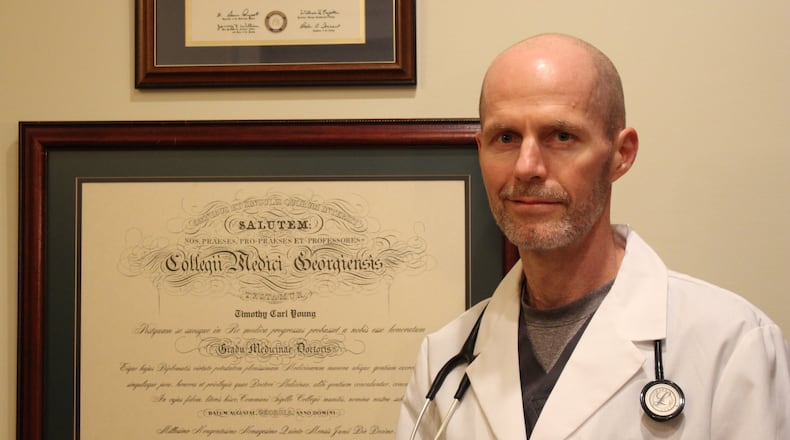A former Georgia prison doctor will get his day in court to argue that he was the victim of retaliation for leaking information on dangerous conditions at Augusta State Medical Prison.
In allowing Dr. Timothy Young to pursue his claims, a federal judge rejected efforts by the prison warden and by Georgia Correctional HealthCare and its statewide medical director to have the case decided in their favor without going to trial.
Warden Ted Philbin and Georgia Correctional HealthCare statewide medical director Dr. Billy Nichols had argued, among other things, that Young wasn’t protected by free speech rights when he secretly provided information about the prison conditions to The Atlanta Journal-Constitution. Contrary to that assertion, U.S. District Judge J.P. Boulee wrote that Young was acting as a citizen expressing his First Amendment rights.
Georgia Correctional Healthcare also had argued that Young wasn’t protected by the Georgia Whistleblower Act because Young hadn’t cited a specific law, rule or regulation that was violated.
There is no requirement under that state law, which protects public employees, that a whistleblower has to cite a specific code section, the judge wrote.
He went on to say that Young had raised more than just general safety concerns. “The record reflects that he raised numerous concerns specifically related to inmates' constitutional rights to healthcare and employees' state law rights to a safe work environment,” the judge wrote in his Sept. 30 ruling.
Young’s lawsuit alleges that after the AJC published a series of stories about dangerous and unsanitary conditions at the Augusta facility, management began to ignore and delay basic requests for patient care assistance. Security issues worsened, and management stopped properly supervising inmates responsible for cleaning. Then, Young said, he was placed under unusual scrutiny until he finally resigned Jan. 31, 2018 to avoid being fired.
However, the judge ruled that Young had failed to establish that the defendants in his lawsuit had taken any action to coerce him to resign. The judge also dropped the Georgia Department of Corrections as a defendant in the case, ruling that it wasn’t Young’s employer.
The ruling details Young’s attempts for years to get the prison staff and Georgia Correctional HealthCare to address the problems at the facility, where he had worked since 2001.
As early as 2012, Young had notified Nichols of concerns that patient care standards were not being met. More inmates were being sent to Augusta State Medical Prison, while the number of medical personnel was dropping, putting care in jeopardy, Young, who was outpatient medical director, warned.
Over the next six years, Young kept reporting the issue to Nichols. And by 2017, Young began reporting to Nichols, the then-prison warden and other officials about conditions that put the medical staff as well as inmates at risk.
The facility itself posed dangers. Temperatures didn’t drop below 85 degrees in the summer, and rarely warmed above 55 in the winter, Young reported. There was asbestos in the floor tile, mold growing in the building, and issues with garbage being stored for extended periods in nursing units and the medical clinic.
Security breaches also alarmed staff, some of which prompted nurses to immediately quit. Among them, inmates without medical appointments were congregating in the medical unit without permission, and security wasn’t being provided for emergency inmate transportation.
When his concerns weren’t addressed, Young talked with an Augusta Chronicle reporter about the security issues, and then began supplying information about the problems to the Atlanta Journal-Constitution. The newspaper’s stories led to the reassignment of the warden and the hiring of Philbin and prompted the Georgia Department of Corrections to begin a cleanup of the facility.
A trial date has not been set.
About the Author
Keep Reading
The Latest
Featured





